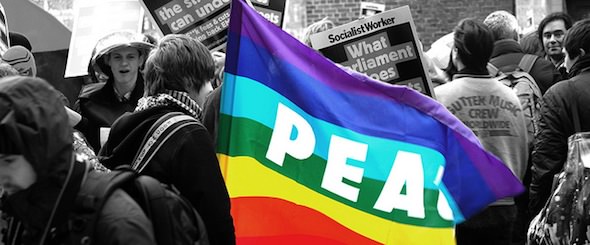Creating the World We Want
If we do not like big finance capitalism, what will take the place of the current economy?
By Kevin Zeese and Margaret Flowers, Popular ResistanceThis article originated with Popular Resistance.
February marks the third anniversary of the 2011 revolt in Wisconsin, the occupation of the state capital and mass protests against the attack on workers. Wisconsin was the largest of the protests at that time, but across the United States there were a series of protests against foreclosures, austerity and the unjust economy.
The Wisconsin uprising, along with the Arab Spring and Indignado movement in Europe, inspired Occupy, a revolt that began on Wall Street and spread across the nation. It was a revolt against an economic system – big finance capitalism – that is causing a corrupt and unfair economy; as well as against a government that serves the interests of the wealthiest before meeting the necessities of the people.
People often want to know what the movement for social and economic justice wants. Occupy Wall Street issued its Declaration of the Occupation of New York City which laid out a series of grievances. But, in addition to knowing what we oppose, we need to define what we stand for. If we do not like big finance capitalism, what will take the place of the current economy?
During the organizing of the occupation in Washington, DC on Freedom Plaza we developed a list of 15 core crisis issues that the country is facing and we outlined solutions to them. These solutions are supported by super-majorities of Americans who, polls show, could rule better than the elites.
At the core of these solutions is the desire to put in place an economic democracy agenda, building institutions that are controlled by and benefit communities while also protecting the planet. By building wealth in a way that is more equitable and democratic, the rule of money is weakened. A democratized economy shifts political power away from concentrated capital to the public and further empowers people by meeting their basic needs for shelter, food, education, healthcare and income.
In many respects we are in a conflict with big finance capitalism and seeking to birth a new economy that serves the people. How do we get there? In her book, Getting Past Capitalism: History, Vision, Hope, Cynthia Kaufman suggests we are in a variety of struggles and rather than seeking total replacement, we need to build healthy institutions while challenging those unhealthy ones we can defeat. Gar Alperovitz defines the transition as ‘evolutionary reconstruction’, a way that we gradually build a better world.
Economic Democracy
This week, we re-launched It’s Our Economy, a project dedicated to reporting on and assisting the growing movement for economic democracy. We define economic democracy as:
… premised on the idea that people should not cede power to mega-corporations, big finance, or a “professional” political class. The people have the shared knowledge to help build an economy that works to strengthen communities and build wealth for all, not just a few. We recognize the internal contradictions of big finance capitalism and we have seen the failures of state-based socialism and are seeking to create a new type of economy that is democratized, empowers people to gain control over their economic lives and encourages cooperative solutions that create wealth for ourselves and our communities….
Economic democracy also emphasizes the commonwealth. The commons includes not only roads, land, water and resources but also the knowledge and technology developed, often with public dollars, which has been built up over generations….
Economic democracy stands in contrast with neoliberal economics. Neoliberalism privatizes public goods and seeks to commodify everything possible to create profit-centers while cutting public services in the name of austerity.
One way to understand what makes healthy institutions that serve the people is to use a human rights framework. There are five human rights principles. These include:
Universality: Human rights must be afforded to everyone, without exception.
Equity: Every person is entitled to the same access to services and public goods.
Accountability: Mechanisms must exist to enforce the protection of human rights.
Transparency: Government institutions must be open and provide the public with information on the decision-making processes.
Participation: People need to be empowered to participate in the decision-making process.
The need for a new economy based on the goal of benefitting all people, not just the wealthiest, has become more urgent as the impact of the economic collapse and its false recovery are felt. These include high rates of Americans dropping out of the labor force, the wealth divide expanding, record poverty and lowered incomes for most people.
People Are Creating the New Economy in Many Ways
Political and economic leadership continues to go in the opposite direction of what people want: cutting the social safety net and doing little to invest in re-building the economy while the costs of energy, food, healthcare and other necessities rise. People across the country are acting on their own to build an economy that will serve them.The building of the new economy, sometimes called a ‘solidarity economy,’ has been developing for many years, particularly in other areas of the world such as Latin America. As a result we can now see reports of its success. A fundamental belief of economic democracy is to build from the bottom up, starting with local communities. A report this week from the Institute for Self Reliance found that communities with buy local programs have seen local businesses grow three times as fast as communities without such programs and businesses report a 75% increase in customer traffic.
One key aspect of buying local is our food supply. The International Forum on Globalisation reports that “the average plate of food eaten in western industrial food-importing nations is likely to have traveled 2,000 miles from source to plate.” Around the country people are working to change that. Two programs that were in movement news this week were “Our Harvest” and “CropMobster.”
Our Harvest comes out of a 2009 agreement between the United Steelworkers and the Mondragon Co-op to create union co-ops. Our Harvest is a produce farm and food hub for aggregation and food processing. The goal is to re-create this model around the country to provide local foods and good jobs in union co-operatives.
CropMobster is a project from Petaluma, CA that seeks to redistribute food to reduce waste and to provide healthy food while growing a shared economy. CropMobster is an instant-alert service linking communities-in-need with local farmers, producers and food purveyors who have excess food to sell or donate. In one year it has spread to the greater SF Bay Area, with a dozen counties participating. Already, more than 300,000 pounds of food has been saved and over 1 million servings eaten; more than 4,000 participants and hundreds of farmers and small food businesses are joining with CropMobster.
Another issue that has been in the news lately because of multiple environmental disasters is the quality of drinking water. The chemical spill in West Virginia, coal slurry spills, hydrofracking and pipelines bursting in multiple states have been a few examples of how fresh water is now at risk. In addition, the extraction of fossil fuels and uranium are consuming tremendous amounts of water even in areas that are facing droughts. Water will be an item on the political agenda at the state and national level. This week in Europe, 1.66 million people were able to put the issues of the right to clean water and stopping water privatization before the European Parliament.
At the center of so many issues – the environment, climate, water, air, jobs – is energy. President Obama and the bi-partisans in Congress continue to push a disastrous “all of the above” energy strategy that is leading to extreme energy extraction with terrible environmental consequences. The corporate duopoly seems unable to challenge big oil, gas, coal and nuclear to put in place the carbon-free, nuclear-free energy economy that is needed.
In the absence of national leadership, people are moving forward. Over 80 landowners have dedicated nearly 20,000 acres to what will become the largest wind farm in South Dakota that will increase the wind energy output in the state by 50%. As solar rapidly grows in the United States, research is now showing that more people will be employed by solar than by oil and coal combined.
Big changes are also on the horizon in the labor front. There are widespread battles for raising the minimum wage to a living wage, and while many companies treat their employees as if they were disposable, in other workplaces employees are becoming owners so they can share in the wealth created by their labor. There is a growing movement for worker-owned cooperatives with national meetings in the United States and in Europe.
An example that was in the news this week was WinCo, a growing competitor to Walmart. WinCo is now operating 93 employee-owned stores in seven states with nearly 15,000 employees. The company has lower prices than Walmart and provides employees with a health plan that includes dental and vision as well as an Employee Stock Ownership Plan for their pension.
Other businesses are creating a more just world by redefining corporate charters so that one of their purposes is to provide public benefits rather than profits to investors. In the past few years, 20 states, including the District of Columbia, have enacted legislation that allows companies to register as benefit corporations and 16 more states are considering it. Delaware, the home of half of US corporations and two-thirds of Fortune 500 companies, enacted a B Corp. law. This status protects corporations from lawsuits by shareholders for not maximizing profit, and it even gives shareholders the right to sue the corporation for failing to optimize its social mission.
We are in a Renaissance
The examples above just give a taste of all of the changes that are taking place to create new systems that replace the old failing ones. For more ideas, visit the “Create” section of PopularResistance.org or ItsOurEconomy.us.
What is amazing is that around the world, the same ideas and values are being put forward. People are joining together to create societies that respect life and the planet and that are more horizontal and just. We are truly in a time of transformation which is made more urgent by the many crises we face.
There has been talk of global revolution, and in some areas, revolution – the changing of governments – is occurring. But we are not yet in a global revolution. In his article, “Revolution, or Digital-Age Renaissance,” Bernardo Gutierrez writes, “Ruskoff argues that the revolution has not arrived and what we are experiencing is a new renaissance. ‘Renaissances are historical instances of widespread recontextualisation. It is the rebirth of old ideas in a new context. Renaissance is a dimensional leap, when our perspective shifts so dramatically that our understanding of the oldest, most fundamental elements of existence changes. The stories we have been using no longer work.’” Gutierrez explains that revolutions come after the renaissance.Currently people are not only creating new systems, but they are questioning the stories that have been told to maintain the status quo and are recognizing that many of our restraints are artificial. People do have the ability to rethink the premises upon which we base our assumptions and to change their views and behaviors.
For decades we have been taught to believe in capitalism and neo-liberalism. We have been told that there will always be poor people and we must accept that. We’ve been told that wealth trickles down and that we should all compete to achieve the “American Dream.” We’ve thought that in order to achieve that dream we must go into debt. And we’ve believed that the people in power should be trusted to make decisions for us, that we didn’t have the capacity to make them.
All of that is changing and being turned in its head. Awareness is growing that we can do things differently. People are actively confronting the old ways through both resistance and the creation of new approaches or the re-emergence of older methods. One area is the recognition that there are alternatives to debt-based economies. This is not a new idea. There were debt jubilees in ancient history.
In the article, “Debt Refusal Essential To Rebuilding Popular Democracy,” the editor writes that “resisting debt is not only moral, it may be essential to re-envisioning a democracy built on legitimate bonds to our community.” StrikeDebt, which was organized out of Occupy Wall Street, teaches us that “working together to build greater economic democracy would mean weaving a dense, creative network where our debts are to each other, not to them (read: the big banks).”StrikeDebt created a Debt Resister’s Manual and is organizing a nationwide debt resistance movement. Their new manual is due out soon.
Another area of renaissance is globalization. To date, globalization has been based on the neoliberal economic model that leaves poverty and environmental destruction in its wake. But now that we understand these consequences , it is becoming more difficult for governments to continue on this path. A case in point is the current Trans-Pacific Partnership which was negotiated for years in secret and the plan was to pass it quietly through Congress using Fast Track. That effort has stalled for now and instead civil society groups are working together to redefine what global trade should look like and how it should be governed.
There is a call for ‘deglobalization’ which does not oppose global trade but refers to orienting trade so our communities can build local economies, to produce goods that are needed and to become more self-reliant. A detailed plan for this is outlined in the blog on systemic alternatives. They write that deglobalization is not about withdrawing from the world economy but is about restructuring it: “Today’s need is not another centralized global institution but the deconcentration and decentralization of institutional power and the creation of a pluralistic system of state and non-state institutions and organizations interacting with one another, guided by broad and flexible agreements and understandings, which receive their authority and legitimacy from below.”
We have an opportunity right now while trade deals are stalled to redefine global governance. Collectively, the people can confront the dominant paradigms and global power structure and rebirth a world grounded in the principles of human rights and protection of the planet. Resistance is not only protest, but includes acts of creation. When you get involved in your community to build democratized economies, you are part of the global transformation.
This article is produced by PopularResistance.org in conjunction with AlterNet. It is based on PopularResistance.org’s weekly newsletter reviewing the activities of the resistance movement.
Kevin Zeese, JD and Margaret Flowers, MD are participants in PopularResistance.org; they co-direct It’s Our Economy and co-host Clearing the FOG. Their twitters are @KBZeese and MFlowers8.
Your support matters…Independent journalism is under threat and overshadowed by heavily funded mainstream media.
You can help level the playing field. Become a member.
Your tax-deductible contribution keeps us digging beneath the headlines to give you thought-provoking, investigative reporting and analysis that unearths what's really happening- without compromise.
Give today to support our courageous, independent journalists.






You need to be a supporter to comment.
There are currently no responses to this article.
Be the first to respond.